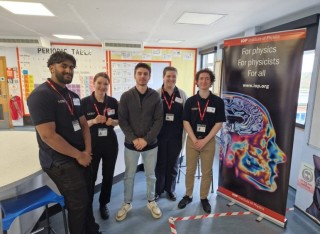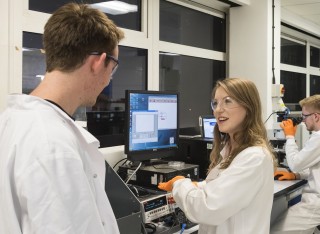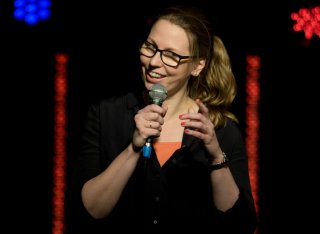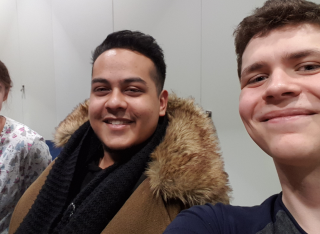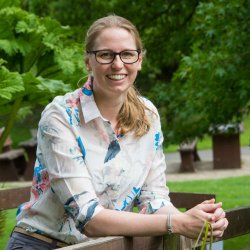
Dr Caroline Shenton-Taylor
About
Biography
Caroline is a Applied Nuclear Physics Senior Lecturer and leads the Nuclear Applications and AI Surrey Group, addressing challenges within nuclear security, nuclear decommissioning, nuclear forensics, nuclear medicine and health monitoring.
Alongside her research and teaching, Caroline is passionate about scientific exchange and runs the YouTube channel Dr CST She was the season 2 and 3 co-host of the Surrey Speaks Podcast, and has contributed to Radio 4, local radio and numerous festival and outreach events. Explore more of Caroline's outreach work on her Dr CST website.
Caroline obtained her PhD in the field of Magnetic Compton Scattering in 2007 from the University of Warwick. Working with synchrotron X-rays, she explored a range of magnetic materials with applications including enhanced computer memory and innovative refrigeration. From 2007 to 2017 Caroline transitioned into industry, leading a diverse portfolio of scientific research projects on behalf of the UK Ministry of Defence and UK Home Office. Throughout this time Caroline was the Team and Technical Lead for an interdisciplinary research team, focused on the development of novel methods to detect the presence of radiological and nuclear materials. in 2017 she joined the University of Surrey forming the Nuclear Applications and AI team.
Areas of specialism
University roles and responsibilities
- MPhys Placement Lead (Sept 2023 - on)
- Physics Undergraduate Admissions Tutor 2018-2023
- Acting Senior Tutor for Professional Training Jan-Sept 2018
- Institute of Physics IOP Mentor (2009 onwards)
My qualifications
Previous roles
News
ResearchResearch interests
Active research
- 2022-2025, Optimisation of AI for cancer screening lead for the University of Surrey in collaboration with National Physical Laboratory Data Science and Medical Physics, and the Royal Surrey NHS Foundation Trust Scientific Computing
- 2023-2024, Data analytics and AI for optimised radiation detection principal investigator for the University of Surrey and part of the NuSec Sigma Data Challenge
- 2023-2026, Automated Decision Making to Streamline Radioisotope Identification
- 2023-2027, Optimisation of radiation health monitoring through machine learning and data fusion part of NTRnet
- 2022-2025, Enhanced nuclear fuel monitoring, part of the supervisory team in collaboration with the National Physical Laboratory
Past projects
- Machine learning techniques for nuclear decommissioning lead in collaboration with the University of Surrey Chemistry Department, National Nuclear Laboratory and part of the TRANSCEND consortium | 2019-2023
- Optimised scintillator section through fuzzy logic principal investigator for the University of Surrey in collaboration with the Nuclear Science Security Network | 2021
- Quantum dot enhanced detection technology principal investigator for the University of Surrey | 2017-2021
- Innovative alpha detection for environmental applications principal investigator for the University of Surrey using Airthings Radon detector | 2018-2019
- Thermoluminescence of fibres and beads for radiation dosimetry lead for the University of Surrey | 2018-2022
Research collaborations
Caroline has collaborated and exchanged scientific ideas with a wide range of organisations including:
- US Government Defence Departments
- US National Laboratories
- University of Illinois
- AWE
- BAE
- Imperial College London - Physics Department
- University of Manchester - Maths Department
- University of Liverpool - Physics Department
- University College London - Physics Department
- St Mary's University
- National Nuclear Laboratory
- National Physical Laboratory
- Royal Surrey NHS Foundation Trust
- UK Home Office
- UK Ministry of Defence
Indicators of esteem
Lynne Millward Academic Staff Member of the Year 2023
MoD Chief Scientific Advisers Commendation Award 2011
Famelab 2014 UK National Winner
British Aerospace Engineering Chairman's Award 2010
International Famelab 2014 Audience Winner
Hall of Famelab 2017 Reserve
Research interests
Active research
- 2022-2025, Optimisation of AI for cancer screening lead for the University of Surrey in collaboration with National Physical Laboratory Data Science and Medical Physics, and the Royal Surrey NHS Foundation Trust Scientific Computing
- 2023-2024, Data analytics and AI for optimised radiation detection principal investigator for the University of Surrey and part of the NuSec Sigma Data Challenge
- 2023-2026, Automated Decision Making to Streamline Radioisotope Identification
- 2023-2027, Optimisation of radiation health monitoring through machine learning and data fusion part of NTRnet
- 2022-2025, Enhanced nuclear fuel monitoring, part of the supervisory team in collaboration with the National Physical Laboratory
Past projects
- Machine learning techniques for nuclear decommissioning lead in collaboration with the University of Surrey Chemistry Department, National Nuclear Laboratory and part of the TRANSCEND consortium | 2019-2023
- Optimised scintillator section through fuzzy logic principal investigator for the University of Surrey in collaboration with the Nuclear Science Security Network | 2021
- Quantum dot enhanced detection technology principal investigator for the University of Surrey | 2017-2021
- Innovative alpha detection for environmental applications principal investigator for the University of Surrey using Airthings Radon detector | 2018-2019
- Thermoluminescence of fibres and beads for radiation dosimetry lead for the University of Surrey | 2018-2022
Research collaborations
Caroline has collaborated and exchanged scientific ideas with a wide range of organisations including:
- US Government Defence Departments
- US National Laboratories
- University of Illinois
- AWE
- BAE
- Imperial College London - Physics Department
- University of Manchester - Maths Department
- University of Liverpool - Physics Department
- University College London - Physics Department
- St Mary's University
- National Nuclear Laboratory
- National Physical Laboratory
- Royal Surrey NHS Foundation Trust
- UK Home Office
- UK Ministry of Defence
Indicators of esteem
Lynne Millward Academic Staff Member of the Year 2023
MoD Chief Scientific Advisers Commendation Award 2011
Famelab 2014 UK National Winner
British Aerospace Engineering Chairman's Award 2010
International Famelab 2014 Audience Winner
Hall of Famelab 2017 Reserve
Supervision
Postgraduate research supervision
PhD students, Primary Supervisor
- L Tomaszewski, started 2024, Optimisation of radiation health monitoring through machine learning and data fusion
- J Wroe-Brown, started 2023, Automated Decision Making to Streamline Radioisotope Identification.
- A Worthy, started 2022, Development and use of new and derived data to facilitate the optimisation and evaluation of breast screening AI tools.
- A Hickman, started 2022, Assessing the reliability of AI for predicting the risk of breast cancer.
- L Lee-Brewin, 2019-2023, Machine Learning Techniques Applied to Challenging Gamma Spectra https://doi.org/10.15126/thesis.901067
- C Termsuk, 2018-2022 Silica based fibres for radiation dosimetry https://doi.org/10.15126/thesis.900471
- C Grove, 2017-2021 Quantum Dot Loaded Nanocomposite Plastic Scintillators, https://doi.org/10.15126/thesis.900111
- K Ley, 2016-2020, Thermoluminescence of silica beads for dosimetry up to 250 kGy, formerly with Dr Lohstroh https://doi.org/10.15126/thesis.00853311
- S Parsons Detecting ionizing radiation with polarising light (completed 2017) Industry supervisor https://openresearch.surrey.ac.uk/esploro/outputs/99511485702346
General topics for future UG, MSc and PhD projects
- Fuzzy logic for nuclear applications
- Convolutional neutral networks applied to Nuclear Security
- Machine leaning within Nuclear Medicine
- Use of automatic AI code generation for the Nuclear Industry
- AI Deep Learning methods
- Genetic algorithms, sparse data techniques
Teaching
Current Teaching
- U/G Year 1 (Level 4) PHY1033 Fundamentals of Physics - Module Lead
- U/G Year 4 (Level 7) PHYM051 MPhys Dissertation - Module Lead
- U/G Year 3 (Level 6) PHY3063 STEM Education & Public Engagement - Module Lead
- U/G Year 3 (Level 6) PHY3062 Interim MPhys Report - Module Lead
- MSc Course (Level 7) PHYM041 Extended Group Project - Module Tutor
Supervisions
- PhD supervision
- MSc Dissertation Project supervision
- MPhys Visiting Tutor
- BSc Final Year Project supervision
- Professional Training Year (PTY) Visiting Tutor
- Personal Tutor
Past Teaching
Publications
Highlights
Over 120 authored technical industrial reports (2007-2017)
Examples of co-authored publications/articles/proceedings are listed below.
Developing feed‑forward neural networks to perform identification on a wide variety of radionuclides in gamma spectra (2025) | J Wroe-Brown, C Shenton-Taylor 10.1007/s10967-025-10523-2
Assessing the generalisation of artificial intelligence across mammography manufacturers (2025) | A J Hickman, S Gomes, L M Warren, N A S Smith, C Shenton-Taylor https://doi.org/10.1371/journal.pdig.0000973
Validation of simulated training sets using a convolutional neural network for isotope identification in urban environments (2025) L Lee-Brewin, R Holden, C Shenton-Taylor doi.org/10.1371/journal.pone.0323053
Synthesised low-dose clinical screening mammograms: an evaluation of suitability for AI training (2025) A Worthy, N Smith, C Shenton-Taylor doi 10.1016/j.rcro.2024.100179
Creation of simulated mammography data to supplement machine learning training datasets (2024) A. Worthy, A. Mackenzie, N. Smith, and C. Shenton-Taylor SPIE IWBI 2024
Using principle component analysis to identify isotopes in gamma spectra collected in urban environments (2024) J. Trevallion, L Lee-Brewin, C. Shenton-Taylor IEEE NSSMIC doi 10.1109/NSS/MIC/RTSD57108.2024.10657193
Investigating detector response and temperature dependence in the U.K. SIGMA dataset (2024) R Holden, J. Biggs, L. Lee-Brewin, C. Shenton-Taylor IEEE NSSMIC doi 10.1109/NSS/MIC/RTSD57108.2024.10657403
Transitioning neural network isotope identifiers to real-world deployment scenarios (2024) L. Lee-Brewin, C. Shenton-Taylor IEEE NSSMIC doi 0.1109/NSS/MIC/RTSD57108.2024.10657671
An artificial neural network algorithm developed for shielded multi-isotope identification (2023) L Lee-Brewin, D. Read and C. Shenton-Taylor doi 10.1088/1748-0221/18/05/P05043
Thermoluminescence Glow Curve Study of beta irradiated Ge doped core fibre with different dopant concentrations, (2022) C. Termsuk, S. Sweeney and C. Shenton-Taylor, Radiation Physics and Chemistry, https://doi.org/10.1016/j.radphyschem.2022.109974
Fading and Residual Responses for Thermoluminescent Dosimetry of Silica Beads Irradiated Using a High-dose Electron-beam (2021) K Ley, S A Hashim, A Lohstroh, C Shenton-Taylor, D A Bradley, Radiation Physics and Chemistry https://doi.org/10.1016/j.radphyschem.2021.109366
X-ray Luminescence of Nanocomposite Plastic Scintillator using CuInS/ZnS Quantum Dots (2021) C.L. Grove, I.H.B. Braddock, M.P. Taggart, C. Crean, S.J. Sweeney, P.J. Sellin, and C. Shenton-Taylor SORMA West
Thermoluminescence response of silica beads to high-dose irradiations (2020) K Ley, S A Hashim, A Lohstroh, C Shenton-Taylor, D A Bradley, Radiation Physics and Chemistry, doi.org/10.1016/j.radphyschem.2019.108349
Application of a novel search method to handled gamma radiation detection (2019) P K Soin, S Pitts, C Shenton-Taylor, J Barnes, IEEE Sensors Journal, http://dx.doi.org/10.1109/JSEN.2019.2945314
Investigating the components of signals produced by the Pockels CCD imaging technique in CdZnTe (2019) S Parsons, A Langley, C Shenton-Taylor, A Lohstroh, IEEE Transactions on Nuclear Science http://dx.doi.org/10.1109/TNS.2018.2859245
Effect of shielding conductivity on magnetic induction tomographic security imagery (2017) J Wood, R Ward, P Tatum, C Shenton-Taylor, S Taylor, G Bagley, M Joseph, J C Watson, IEEE Transactions on Magnetics, 53 issue 4 DOI: 10.1109/TMAG.2016.2618780
Conference, Assessment of quantum dots for nuclear security (2017) T Crane, A Gavin, J Burns, D Glass, P Sellin, C Shenton-Taylor, Nuclear Science Symposium and Medical Imaging Conference 2017/IEEE
Predicting the air fluorescence yield of radioactive sources (2016) C Thompson, E E Barritt, C Shenton-Taylor, Elsevier Radiation Measurements, 88, pp. 48-54 https://doi.org/10.1016/j.radmeas.2016.02.013
Discrimination of liquid samples using magnetic induction tomography (2016) P Tatum, R Ward, C Lloyd, J Wood, S Taylor, C Shenton-Taylor, J. Watson, ESMA 2016
Cadmium zinc telluride based infrared interferometry for X-ray detection (2015) A Lohstroh, I Della-Rocca, S Parsons, A Langley, C Shenton-Taylor, D Blackie, Applied Physics Letters 106 063507 https://doi.org/10.1063/1.4908290
Investigation of THGEM technology for nuclear security applications (2015) K Ley, A Langley, C Steer, C Shenton-Taylor, EPJ Web of Conferences 2015/MPGD
Imaging by electromagnetic induction with resonant circuits (2015) R Guillizoni, J C Watson, P A Bartlett, F Renzoni, SPIE Image Sensing Technologies: Materials, Devices, Systems, and Applications II, At Baltimore, USA, Volume: Proc. SPIE 9481 DOI: 10.1117/12.2183180
Magnetic Imaging through metallic enclosures (2015) B J Darrer, J C Watson, P Bartlett, F Renzoni, 7th International Symposium on Process Tomography
Wavelet analysis of high and low resolution gamma-ray spectra: an investigation of peak finding techniques (2015) C Thompson, R L Turner, K Vaughan, Nuclear Science Symposium & Medical Imaging Conference 2015/IEEE
Wavelet analysis of shielded radiological material: The applicability of wavelet analysis for National Security (2014) K Vaughan, R L Turner, P Kendall, Nuclear Science Symposium and Medical Imaging Conference 2014/IEEE
Wavelet analysis for the separation of spectral features (2014) R L Turner, K Vaughan, IMA's 10th International Conference on Mathematics in Signal Processing
Distributed detector radiation networks: Static and Mobile sensor configurations (2014) C Shenton-Taylor, R Murphy, N Shute, Nuclear Science Symposium and Medical Imaging Conference 2014/IEEE
Spectra fusion using fuzzy logic (2014) A Langley and C Shenton-Taylor, IMA's 10th International Conference on Mathematics in Signal Proceedings
Development of a three-dimensional model for sensor positioning (2013) C Shenton-Taylor, Nuclear Science Symposium and Medical Imaging Conference 2013/IEEE
Exploration of the Pockels effect for radiation detection applications (20 12) D Blackie, A Langley, C Shenton-Taylor, V Permual, Nuclear Science Symposium and Medical Imaging Conference 2012/IEEE
Signal Analysis and data fusion methodologies (2012) C Shenton-Taylor, G Hurst, K Duore, P R Arthur, Nuclear Science Symposium and Medical Imaging Conference 2012/IEEE
A multi-phase equation of state applied to the study of shock loaded tin (2011) C Shenton-Taylor, A Glauser, E Price, T Ota, APS Shock Compression of Condensed Matter
Spin and orbital moments in Fe3O4 (2010) J A Duffy, J W Taylor, S B Dugdale, C Shenton-Taylor, M W Butchers, S R Giblin, M J Cooper, Y Sakurai, M Itou, Physical review. B, Condensed matter 04/2010; 81(13). https://doi.org/10.1103/PhysRevB.81.134424
Bulk spin polarization of Co(1-x)Fe(x)S2 (2009) C Utfeld, S R Giblin, J W Taylor, J A Duffy, C Shenton-Taylor, J Laverock, S B Dugdale, M Manno, C Leighton, M Itou, Y Sakurai, Physical Review Letters 11/2009; 103(22):226403.
Development of magnetic Compton scattering using a 9T cryomagnet at the ESRF (2008) J A Duffy, J W Taylor, C Shenton-Taylor, C Steer. L V Blaauw, M J Cooper, Acta Crystallographic Section A Foundations of Crystallography http://dx.doi.org/10.1107/S0108767308081609
A short history of magnetic Compton scattering (2007) M J Cooper, C Shenton-Taylor, J A Duffy, C A Steer, L V Blaauw, Nuclear Instruments and Methods in Physics Research Section A Accelerators Spectrometers Detectors and Associated Equipment 09/2007; 580(1):1-7. https://doi.org/10.1016/j.nima.2007.05.010
Compton scattering studies of 4f ferromagnetism (2007) M J Cooper, J A Duffy, Z F Banfield, A M Bebb, L Blaauw, C Shenton-Taylor, C Steer, J W Taylor, Radiation Physics and Chemistry 05/2007; https://doi.org/10.1016/j.radphyschem.2005.07.034
Magnetic Compton scattering study of the magnetocaloric material Gd7Pd3 (2007) C Shenton-Taylor, J A Duffy, J W Taylor, C A Steer, D N Timms, M J Cooper, L V Blaauw, Journal of Physics Condensed Matter 05/2007; 19(18):186208. http://dx.doi.org/10.1088/0953-8984/19/18/186208
Spin wave dynamics of MnO confined in nanometer pores (2006) J W Taylor, J A Duffy, C S Steer, C Shenton-Taylor, Journal of Magnetism and Magnetic Materials 03/2007; 310(2): https://doi.org/10.1016/j.jmmm.2006.11.067
The size enhanced spin moment in NiO nanoparticles (2006) C Steer, C Shenton-Taylor, J.A. Duffy, Spring-8 Highlights Journal
Spin-resolved Compton scattering study of RuSr2GdCu2O8 (2005) Z F Banfield, J A Duffy, J W Taylor, C A Steer, A Bebb, M J Cooper, L Blaauw, C Shenton-Taylor, R Ruiz-Bustos, Journal of Physics Condensed Matter 08/2005; 17(36):5533. http://dx.doi.org/10.1088/0953-8984/17/36/009
Academic Publications – Technical Sponsor
Magnetic Imaging: A new tool for UK National Nuclear Security (2015) B J Darrer, J C Watson, P Bartlett, F Renzoni, Nature Scientific Reports 01/2015; Sci. Rep. 5, 7944 DOI: 10.1038/srep07944I https://doi.org/10.1038/srep07944
Toward an Automated Setup for Magnetic Induction Tomography (2015) B J Darrer, J C Watson, P Bartlett, F Renzoni, IEEE Transaction on magnetics 01/2015, 51(1), 6500105 https://ieeexplore.ieee.org/document/7029227
A bio-inspired chemical sensor of gamma and neutron radiation (2014) J A Griffith, T A Bayer, Sensors and Actuators B 190 818-821 doi.org/10/1016/j.snb.2013.09.012 https://doi.org/10.1016/j.snb.2013.09.012
